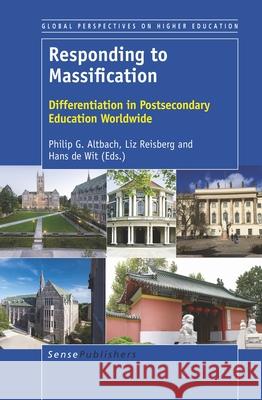Responding to Massification » książka
Responding to Massification
ISBN-13: 9789463510813 / Angielski / Miękka / 2017 / 230 str.
Responding to Massification
ISBN-13: 9789463510813 / Angielski / Miękka / 2017 / 230 str.
(netto: 234,73 VAT: 5%)
Najniższa cena z 30 dni: 236,46
ok. 22 dni roboczych.
Darmowa dostawa!
Global massification of postsecondary education, with more than 200 million students studying at an untold number of institutions focusing on every specialization possible, necessitates a differentiated system of postsecondary education in every country. This book provides the first comparative study of how postsecondary education has evolved in 13 countries. The study offers an analysis of current global realities and how different nations have constructed their response. Our research shows that few countries have developed rational and differentiated academic systems to meet new realities. The book provides insights regarding useful approaches for the development of academic systems. The book reveals similarities and differences in the 13 case studies as different governments have expanded postsecondary education to respond to the massification of enrollment. Postsecondary education has become diversified, but for the most part not adequately differentiated in most countries. Several of the case studies underscore the challenge of sustaining differentiation within the system if credentials from non-university, postsecondary institutions are considered of lesser social status. Too often institutions that successfully address the practical needs of national economies are ultimately merged into the university system. There is an urgent need for the planning and structuring of coherent systems of postsecondary education to serve the increasingly diverse clientele in need of the skills required by the knowledge economy. This study is the first global analysis aimed at understanding how post-secondary education can be organized to meet society’s requirements and points to the need for designing coherent academic systems.











